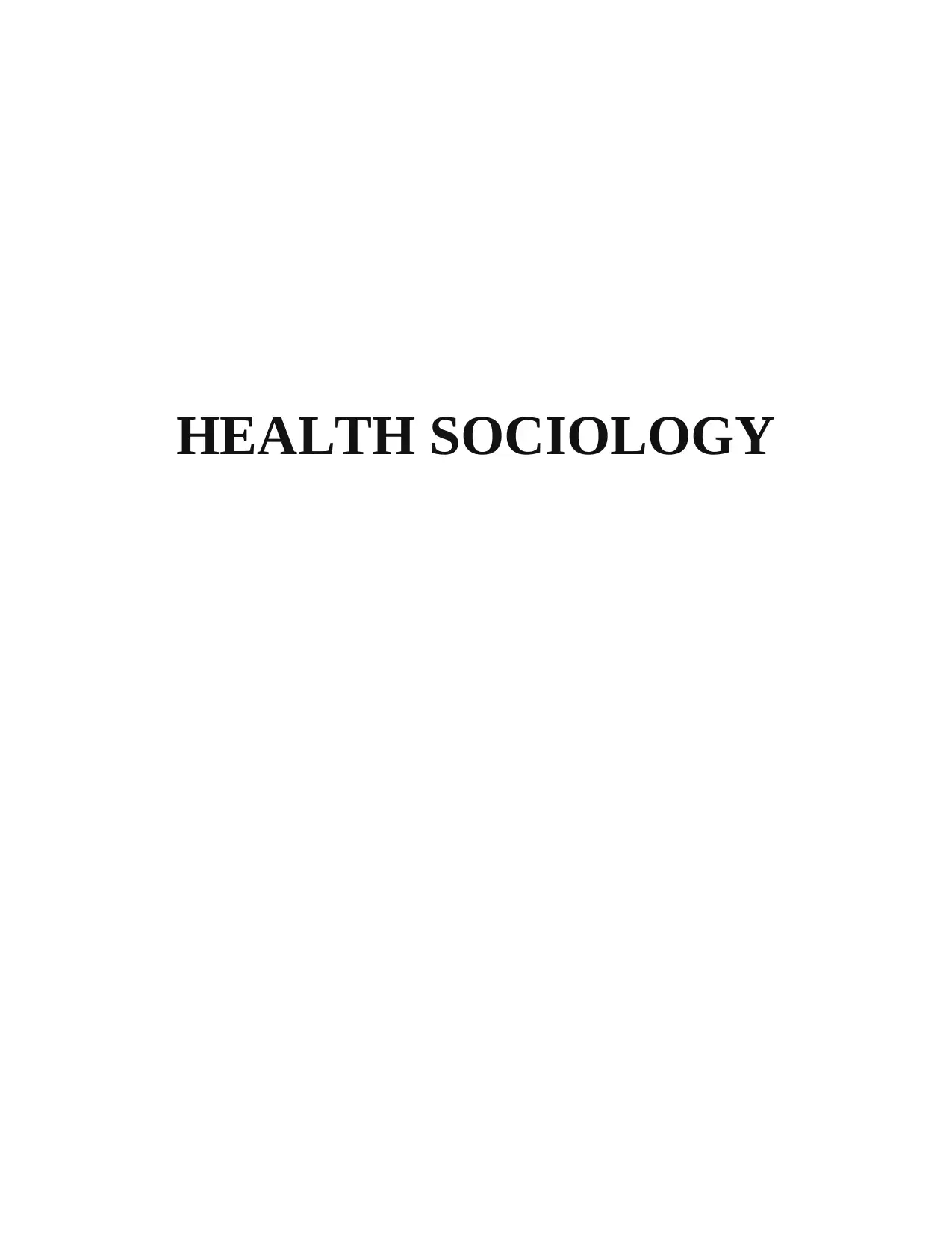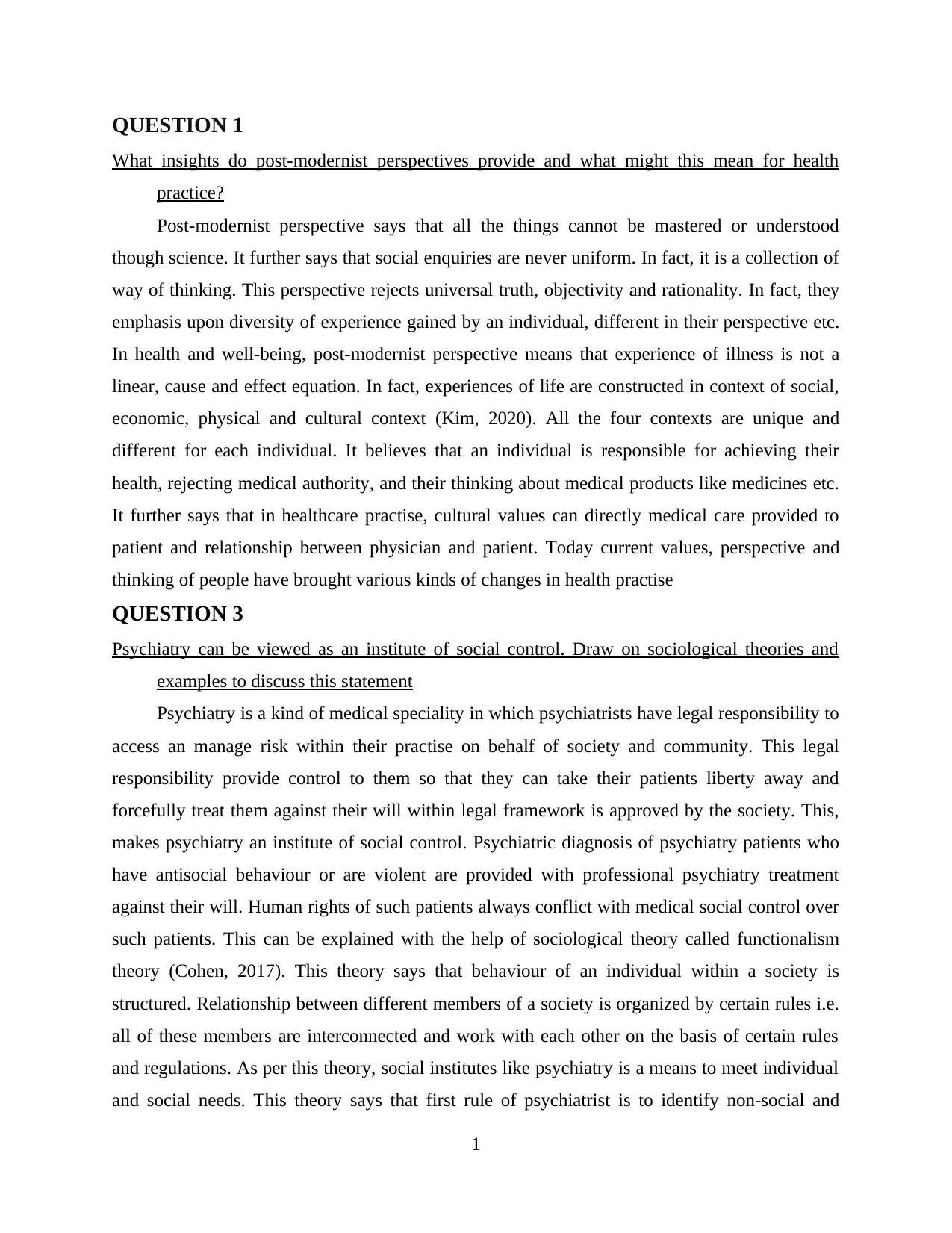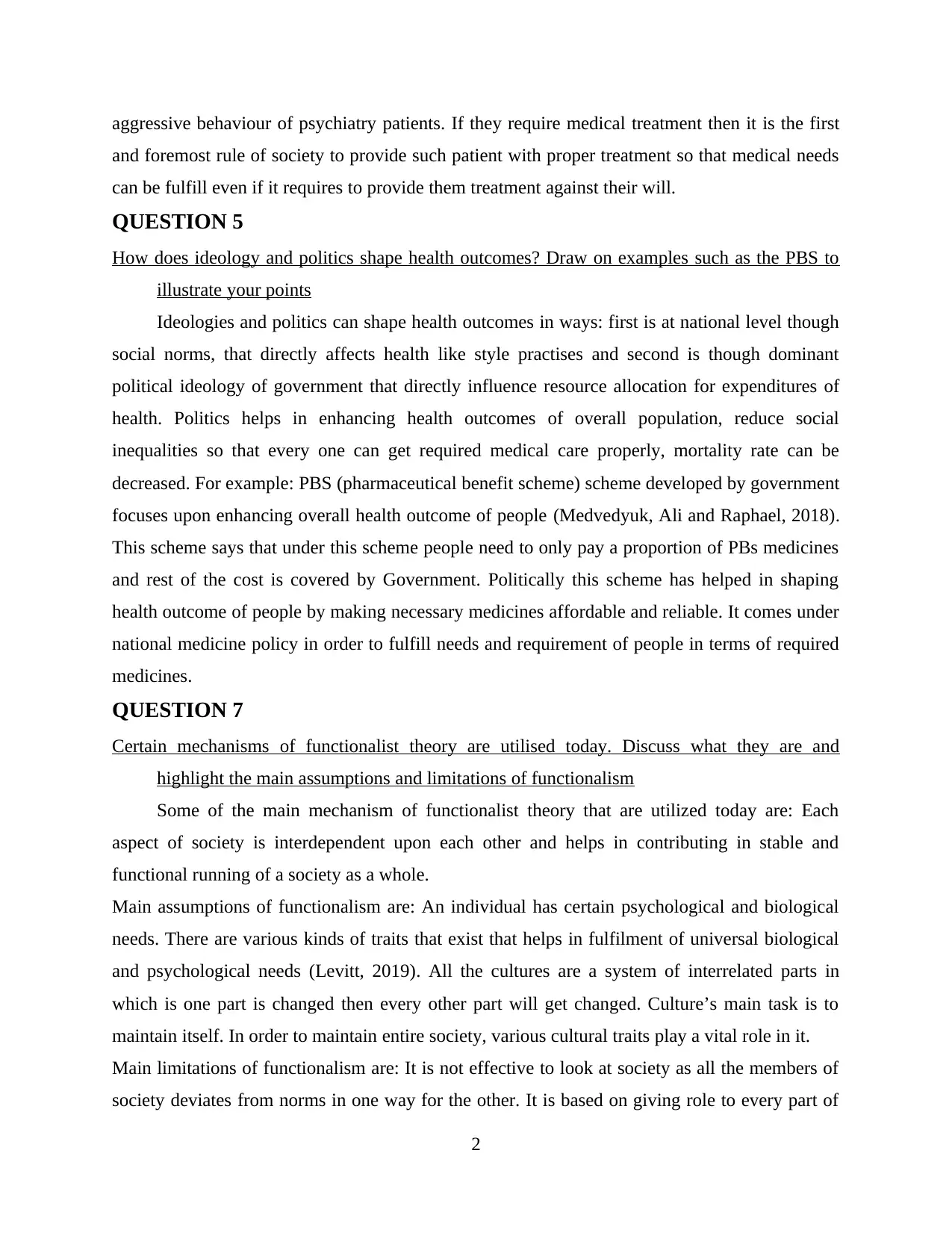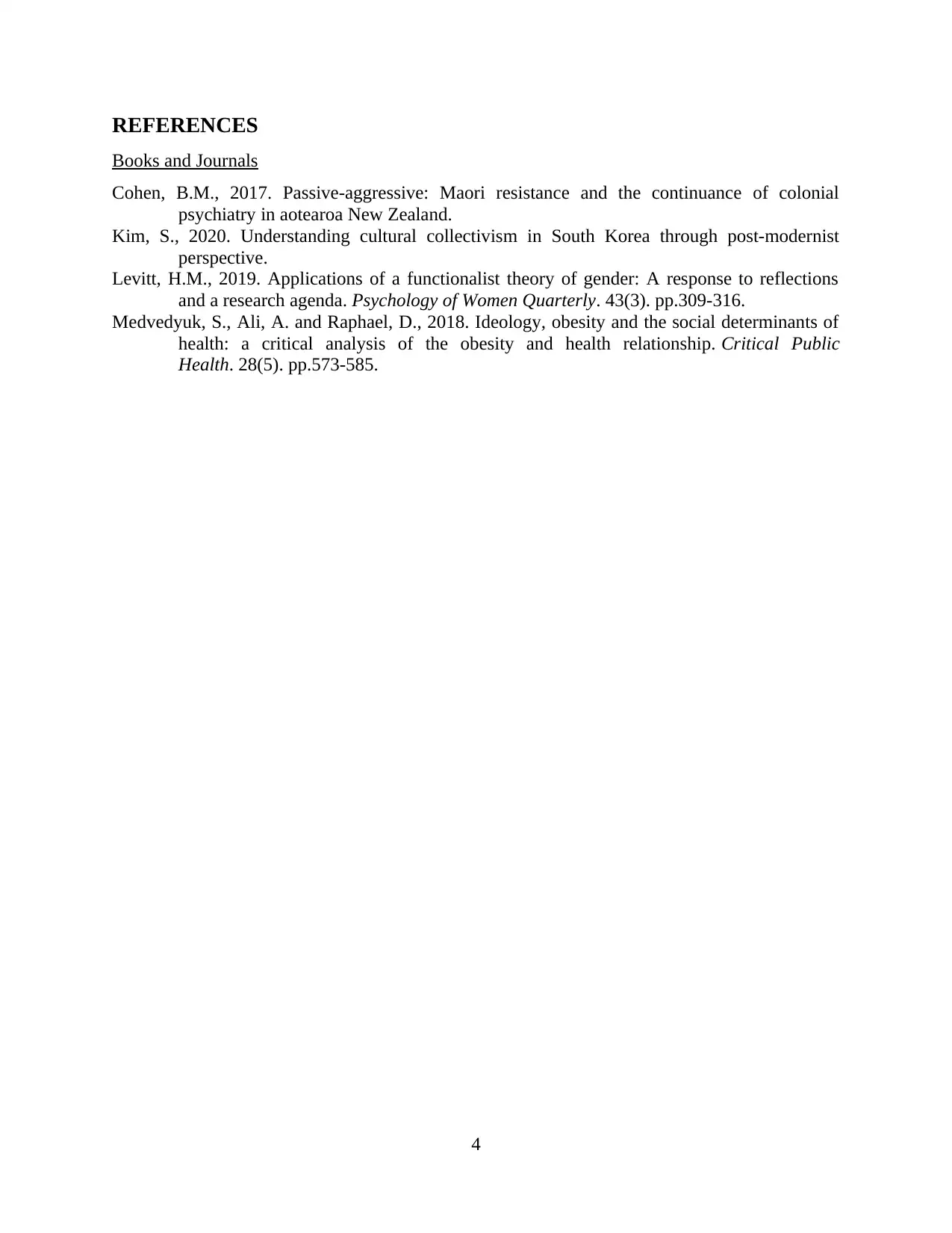Health Sociology: Post-modernism, Psychiatry, Ideology, Functionalism
VerifiedAdded on 2023/01/05
|5
|1027
|100
Homework Assignment
AI Summary
This health sociology assignment addresses several key topics within the field. It begins by exploring post-modernist perspectives, discussing their insights and implications for health practice, emphasizing the subjective and context-dependent nature of illness experiences. The assignment then examines psychiatry as an institute of social control, drawing on sociological theories like functionalism to explain how psychiatric practices can be seen as mechanisms of societal regulation. Furthermore, it analyzes how ideology and politics shape health outcomes, using the Pharmaceutical Benefits Scheme (PBS) as an example of how political decisions can influence public health. Finally, the assignment discusses the mechanisms, assumptions, and limitations of functionalist theory, highlighting its relevance to contemporary society and its applications in understanding social structures and health-related phenomena. References from various books and journals support the analysis.

HEALTH SOCIOLOGY
Paraphrase This Document
Need a fresh take? Get an instant paraphrase of this document with our AI Paraphraser

QUESTION 1
What insights do post-modernist perspectives provide and what might this mean for health
practice?
Post-modernist perspective says that all the things cannot be mastered or understood
though science. It further says that social enquiries are never uniform. In fact, it is a collection of
way of thinking. This perspective rejects universal truth, objectivity and rationality. In fact, they
emphasis upon diversity of experience gained by an individual, different in their perspective etc.
In health and well-being, post-modernist perspective means that experience of illness is not a
linear, cause and effect equation. In fact, experiences of life are constructed in context of social,
economic, physical and cultural context (Kim, 2020). All the four contexts are unique and
different for each individual. It believes that an individual is responsible for achieving their
health, rejecting medical authority, and their thinking about medical products like medicines etc.
It further says that in healthcare practise, cultural values can directly medical care provided to
patient and relationship between physician and patient. Today current values, perspective and
thinking of people have brought various kinds of changes in health practise
QUESTION 3
Psychiatry can be viewed as an institute of social control. Draw on sociological theories and
examples to discuss this statement
Psychiatry is a kind of medical speciality in which psychiatrists have legal responsibility to
access an manage risk within their practise on behalf of society and community. This legal
responsibility provide control to them so that they can take their patients liberty away and
forcefully treat them against their will within legal framework is approved by the society. This,
makes psychiatry an institute of social control. Psychiatric diagnosis of psychiatry patients who
have antisocial behaviour or are violent are provided with professional psychiatry treatment
against their will. Human rights of such patients always conflict with medical social control over
such patients. This can be explained with the help of sociological theory called functionalism
theory (Cohen, 2017). This theory says that behaviour of an individual within a society is
structured. Relationship between different members of a society is organized by certain rules i.e.
all of these members are interconnected and work with each other on the basis of certain rules
and regulations. As per this theory, social institutes like psychiatry is a means to meet individual
and social needs. This theory says that first rule of psychiatrist is to identify non-social and
1
What insights do post-modernist perspectives provide and what might this mean for health
practice?
Post-modernist perspective says that all the things cannot be mastered or understood
though science. It further says that social enquiries are never uniform. In fact, it is a collection of
way of thinking. This perspective rejects universal truth, objectivity and rationality. In fact, they
emphasis upon diversity of experience gained by an individual, different in their perspective etc.
In health and well-being, post-modernist perspective means that experience of illness is not a
linear, cause and effect equation. In fact, experiences of life are constructed in context of social,
economic, physical and cultural context (Kim, 2020). All the four contexts are unique and
different for each individual. It believes that an individual is responsible for achieving their
health, rejecting medical authority, and their thinking about medical products like medicines etc.
It further says that in healthcare practise, cultural values can directly medical care provided to
patient and relationship between physician and patient. Today current values, perspective and
thinking of people have brought various kinds of changes in health practise
QUESTION 3
Psychiatry can be viewed as an institute of social control. Draw on sociological theories and
examples to discuss this statement
Psychiatry is a kind of medical speciality in which psychiatrists have legal responsibility to
access an manage risk within their practise on behalf of society and community. This legal
responsibility provide control to them so that they can take their patients liberty away and
forcefully treat them against their will within legal framework is approved by the society. This,
makes psychiatry an institute of social control. Psychiatric diagnosis of psychiatry patients who
have antisocial behaviour or are violent are provided with professional psychiatry treatment
against their will. Human rights of such patients always conflict with medical social control over
such patients. This can be explained with the help of sociological theory called functionalism
theory (Cohen, 2017). This theory says that behaviour of an individual within a society is
structured. Relationship between different members of a society is organized by certain rules i.e.
all of these members are interconnected and work with each other on the basis of certain rules
and regulations. As per this theory, social institutes like psychiatry is a means to meet individual
and social needs. This theory says that first rule of psychiatrist is to identify non-social and
1

aggressive behaviour of psychiatry patients. If they require medical treatment then it is the first
and foremost rule of society to provide such patient with proper treatment so that medical needs
can be fulfill even if it requires to provide them treatment against their will.
QUESTION 5
How does ideology and politics shape health outcomes? Draw on examples such as the PBS to
illustrate your points
Ideologies and politics can shape health outcomes in ways: first is at national level though
social norms, that directly affects health like style practises and second is though dominant
political ideology of government that directly influence resource allocation for expenditures of
health. Politics helps in enhancing health outcomes of overall population, reduce social
inequalities so that every one can get required medical care properly, mortality rate can be
decreased. For example: PBS (pharmaceutical benefit scheme) scheme developed by government
focuses upon enhancing overall health outcome of people (Medvedyuk, Ali and Raphael, 2018).
This scheme says that under this scheme people need to only pay a proportion of PBs medicines
and rest of the cost is covered by Government. Politically this scheme has helped in shaping
health outcome of people by making necessary medicines affordable and reliable. It comes under
national medicine policy in order to fulfill needs and requirement of people in terms of required
medicines.
QUESTION 7
Certain mechanisms of functionalist theory are utilised today. Discuss what they are and
highlight the main assumptions and limitations of functionalism
Some of the main mechanism of functionalist theory that are utilized today are: Each
aspect of society is interdependent upon each other and helps in contributing in stable and
functional running of a society as a whole.
Main assumptions of functionalism are: An individual has certain psychological and biological
needs. There are various kinds of traits that exist that helps in fulfilment of universal biological
and psychological needs (Levitt, 2019). All the cultures are a system of interrelated parts in
which is one part is changed then every other part will get changed. Culture’s main task is to
maintain itself. In order to maintain entire society, various cultural traits play a vital role in it.
Main limitations of functionalism are: It is not effective to look at society as all the members of
society deviates from norms in one way for the other. It is based on giving role to every part of
2
and foremost rule of society to provide such patient with proper treatment so that medical needs
can be fulfill even if it requires to provide them treatment against their will.
QUESTION 5
How does ideology and politics shape health outcomes? Draw on examples such as the PBS to
illustrate your points
Ideologies and politics can shape health outcomes in ways: first is at national level though
social norms, that directly affects health like style practises and second is though dominant
political ideology of government that directly influence resource allocation for expenditures of
health. Politics helps in enhancing health outcomes of overall population, reduce social
inequalities so that every one can get required medical care properly, mortality rate can be
decreased. For example: PBS (pharmaceutical benefit scheme) scheme developed by government
focuses upon enhancing overall health outcome of people (Medvedyuk, Ali and Raphael, 2018).
This scheme says that under this scheme people need to only pay a proportion of PBs medicines
and rest of the cost is covered by Government. Politically this scheme has helped in shaping
health outcome of people by making necessary medicines affordable and reliable. It comes under
national medicine policy in order to fulfill needs and requirement of people in terms of required
medicines.
QUESTION 7
Certain mechanisms of functionalist theory are utilised today. Discuss what they are and
highlight the main assumptions and limitations of functionalism
Some of the main mechanism of functionalist theory that are utilized today are: Each
aspect of society is interdependent upon each other and helps in contributing in stable and
functional running of a society as a whole.
Main assumptions of functionalism are: An individual has certain psychological and biological
needs. There are various kinds of traits that exist that helps in fulfilment of universal biological
and psychological needs (Levitt, 2019). All the cultures are a system of interrelated parts in
which is one part is changed then every other part will get changed. Culture’s main task is to
maintain itself. In order to maintain entire society, various cultural traits play a vital role in it.
Main limitations of functionalism are: It is not effective to look at society as all the members of
society deviates from norms in one way for the other. It is based on giving role to every part of
2
⊘ This is a preview!⊘
Do you want full access?
Subscribe today to unlock all pages.

Trusted by 1+ million students worldwide

society so that everything is stable within society. It majorly looks at society in macro scale does
not look at people individually.
3
not look at people individually.
3
Paraphrase This Document
Need a fresh take? Get an instant paraphrase of this document with our AI Paraphraser

REFERENCES
Books and Journals
Cohen, B.M., 2017. Passive-aggressive: Maori resistance and the continuance of colonial
psychiatry in aotearoa New Zealand.
Kim, S., 2020. Understanding cultural collectivism in South Korea through post-modernist
perspective.
Levitt, H.M., 2019. Applications of a functionalist theory of gender: A response to reflections
and a research agenda. Psychology of Women Quarterly. 43(3). pp.309-316.
Medvedyuk, S., Ali, A. and Raphael, D., 2018. Ideology, obesity and the social determinants of
health: a critical analysis of the obesity and health relationship. Critical Public
Health. 28(5). pp.573-585.
4
Books and Journals
Cohen, B.M., 2017. Passive-aggressive: Maori resistance and the continuance of colonial
psychiatry in aotearoa New Zealand.
Kim, S., 2020. Understanding cultural collectivism in South Korea through post-modernist
perspective.
Levitt, H.M., 2019. Applications of a functionalist theory of gender: A response to reflections
and a research agenda. Psychology of Women Quarterly. 43(3). pp.309-316.
Medvedyuk, S., Ali, A. and Raphael, D., 2018. Ideology, obesity and the social determinants of
health: a critical analysis of the obesity and health relationship. Critical Public
Health. 28(5). pp.573-585.
4
1 out of 5
Related Documents
Your All-in-One AI-Powered Toolkit for Academic Success.
+13062052269
info@desklib.com
Available 24*7 on WhatsApp / Email
![[object Object]](/_next/static/media/star-bottom.7253800d.svg)
Unlock your academic potential
Copyright © 2020–2025 A2Z Services. All Rights Reserved. Developed and managed by ZUCOL.




